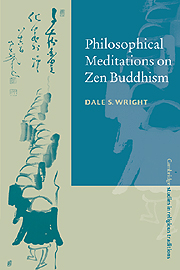Book contents
- Frontmatter
- Contents
- Introduction
- 1 TEXTUALITY: the “dependent origination” of Huang Po
- 2 READING: the practice of insight
- 3 UNDERSTANDING: the context of enlightenment
- 4 LANGUAGE: the sphere of immediacy
- 5 RHETORIC: the instrument of mediation
- 6 HISTORY: the genealogy of mind
- 7 FREEDOM: the practice of constraint
- 8 TRANSCENDENCE: “going beyond” Huang Po
- 9 MIND: the “Great Matter” of Zen
- 10 ENLIGHTENMENT: the awakening of mind
- CONCLUSION: Zen in theory and practice
- Bibliography
- Index
5 - RHETORIC: the instrument of mediation
Published online by Cambridge University Press: 12 November 2009
- Frontmatter
- Contents
- Introduction
- 1 TEXTUALITY: the “dependent origination” of Huang Po
- 2 READING: the practice of insight
- 3 UNDERSTANDING: the context of enlightenment
- 4 LANGUAGE: the sphere of immediacy
- 5 RHETORIC: the instrument of mediation
- 6 HISTORY: the genealogy of mind
- 7 FREEDOM: the practice of constraint
- 8 TRANSCENDENCE: “going beyond” Huang Po
- 9 MIND: the “Great Matter” of Zen
- 10 ENLIGHTENMENT: the awakening of mind
- CONCLUSION: Zen in theory and practice
- Bibliography
- Index
Summary
“Huang Po is such a grandmother that he utterly exhausted himself with your troubles!” said Ta-yu. “And now you come here asking whether you were at fault or not!” At these words, Lin-chi attained great enlightenment. “Ah,” he cried, “there isn't so much to Huang Po's Buddha-dharmal”
The Recorded Sayings of Lin-chiTs'ui-feng asked: “What words does Huang Po use to instruct people?” “Huang Po has no words,” said Lin-chi.
The Recorded Sayings of Lin-chiLanguage plays a far greater role in the mind of a Zen master like Huang Po than that of an “instrument,” a tool intentionally applied to the carrying out of particular purposes. Nevertheless, when language does function as an instrument in Zen, it is a tool of considerable power and precision. Indeed, in its “golden age” and today, Zen has been best known for its unique instrumental rhetoric, its own counterclaims notwithstanding. The “discourse of awakening” in Zen produces a kind of rhetoric very much unlike anything ever heard or read in East Asia or elsewhere, a way of speaking/writing that is distinctively “Zen.” In this chapter we consider both the character of this rhetoric and the role it plays in the quest for “awakening.”
The first extract at the head of this chapter acknowledges the possibility of a rhetorical impetus to awakening: “Lin-chi attained great enlightenment,” “[a]t these words.” Given the principle of “no dependence on language” and the ubiquity of language critique in Zen, who would have thought that enlightenment might “originate dependent” upon “words,” or that “words” might be the primary element structuring its occasion? Were Zen Buddhists unaware of this function of language in Zen?
- Type
- Chapter
- Information
- Philosophical Meditations on Zen Buddhism , pp. 82 - 103Publisher: Cambridge University PressPrint publication year: 1998



